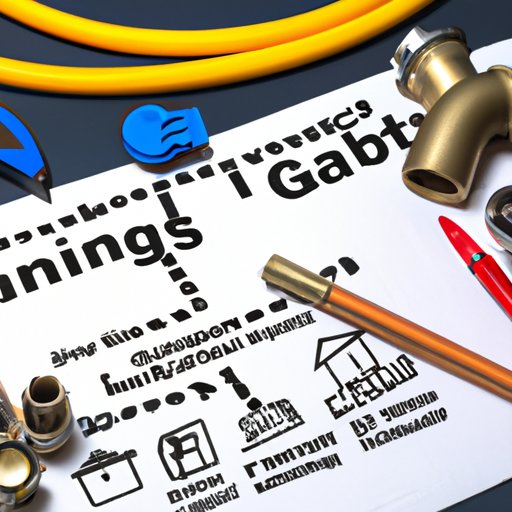Introduction
Starting a plumbing business can be a lucrative and rewarding career path. However, it can also be overwhelming to get started, especially when it comes to understanding the legal requirements and proper preparation for success. This article provides a comprehensive overview of the steps necessary to start a plumbing business, including understanding educational and licensing requirements, gathering essential tools and materials, developing a successful marketing strategy, and creating a business plan.

Necessary Steps and Qualifications for Starting a Plumbing Business
Before you can start a plumbing business, there are certain steps that must be taken to ensure your success. Here is an overview of the qualifications needed to become a licensed plumber.
Educational Requirements
In order to become a licensed plumber, it is important to understand the educational requirements. In the United States, many states require plumbers to have at least two years of experience working in the field before they can apply for a license. Additionally, most states require plumbers to have completed a technical degree or certificate program from an accredited institution, such as a trade school or community college.
Licensing Requirements
After completing the educational requirements, the next step is to apply for a plumbing license. The process for obtaining a license varies by state, but generally requires passing a written exam, providing proof of experience and education, and paying any applicable fees.
Insurance Coverage
It is also important to obtain the proper insurance coverage for your plumbing business. This includes liability insurance to protect against any potential lawsuits, as well as workers’ compensation insurance to cover medical expenses in the event of an accident. Additionally, some states may require plumbers to obtain additional licenses or certifications in order to perform certain types of work.
Tools, Materials, and Equipment Needed
Once you have met the educational and licensing requirements, the next step is to gather all of the necessary tools, materials, and equipment. Here is an overview of the essentials.
List of Essential Tools
The first step is to make sure you have all of the essential tools for the job. This includes a variety of wrenches, pipe cutters, screwdrivers, pliers, and other hand tools. Additionally, you will need a variety of power tools, such as a drill, saw, and sander. You may also want to invest in a pressure washer and water jetter for larger jobs.
Materials and Supplies
In addition to tools, you will also need to purchase a variety of materials and supplies. This includes items such as pipes, fittings, valves, and other plumbing components. Additionally, you will need to stock up on various cleaning supplies, such as drain cleaner, pipe sealant, and other chemicals.
Cost Estimates
When starting a plumbing business, it is important to have a good idea of the cost associated with purchasing all of the necessary tools, materials, and equipment. According to a survey conducted by HomeAdvisor, the average cost of starting a plumbing business ranges from $2,000 to $5,000.
Marketing Strategies
Once you have all of the necessary tools and materials, the next step is to develop a successful marketing strategy. Here are some tips for getting the word out about your business.
Identifying Target Customers
The first step is to identify your target customers. Who are the people who would be most likely to use your services? Are you targeting residential customers or commercial businesses? Understanding your target customer base will help you create effective advertising and promotional campaigns.
Advertising and Promotion
Once you have identified your target customers, the next step is to create an advertising and promotional campaign. This can include traditional methods such as print ads, radio spots, and television commercials. Additionally, you may want to consider using online platforms such as social media, email, and search engine optimization (SEO).
Networking and Referrals
Word of mouth is one of the most powerful forms of marketing, so it is important to take advantage of networking opportunities and ask for referrals from existing customers. Additionally, joining local organizations such as chambers of commerce and professional associations can be a great way to spread the word about your business.
Creating a Website
Finally, it is important to create a website for your business. This will not only provide potential customers with information about your services, but it will also help you establish credibility and trust. Additionally, having a website can make it easier for customers to contact you and schedule appointments.
Developing a Successful Business Plan
Once you have established your marketing strategy, the next step is to create a successful business plan. Here are some key elements to consider when developing your plan.
Setting Goals
The first step is to set goals for your business. What do you hope to accomplish in the short-term and long-term? Setting realistic goals will help you stay focused and motivated as you move forward.
Analyzing the Marketplace
It is also important to analyze the marketplace to gain a better understanding of the competition and potential customers. Research your local area and identify any potential opportunities or challenges you may face.
Developing a Financial Plan
Before launching your business, it is important to create a financial plan. This should include an analysis of your start-up costs, operating expenses, and projected income. Additionally, it is important to establish a budget and stick to it.
Defining Operating Procedures
Finally, it is important to define the operating procedures for your business. This includes establishing policies and procedures for customer service, safety protocols, billing, and more. Establishing clear operating procedures will help ensure the success of your business.
Conclusion
Starting a plumbing business can be a challenging yet rewarding endeavor. By understanding the necessary steps and qualifications for starting a plumbing business, gathering the necessary tools and materials, developing a successful marketing strategy, and creating a business plan, you can increase your chances of success. With the right preparation and dedication, you can build a successful plumbing business.
For more information on starting a plumbing business, check out the Small Business Administration’s guide Start a Plumbing Business.
(Note: Is this article not meeting your expectations? Do you have knowledge or insights to share? Unlock new opportunities and expand your reach by joining our authors team. Click Registration to join us and share your expertise with our readers.)
